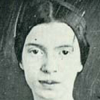Emily Dickinson

Emily Dickinson
Emily Elizabeth Dickinsonwas an American poet. Dickinson was born in Amherst, Massachusetts. Although part of a prominent family with strong ties to its community, Dickinson lived much of her life highly introverted. After studying at the Amherst Academy for seven years in her youth, she briefly attended the Mount Holyoke Female Seminary before returning to her family's house in Amherst. Considered an eccentric by locals, she developed a noted penchant for white clothing and became known for her reluctance to...
ProfessionPoet
Date of Birth10 December 1830
CityAmherst, MA
Tis not that dieing hurts us so- tis living- hurts us more.
I had been hungry all the years- My noon had come, to dine- I, trembling, drew the table near And touched the curious wine. 'Twas this on tables I had seen When turning, hungry, lone, I looked in windows, for the wealth I could not hope to own. I did not know the ample bread, 'Twas so unlike the crumb The birds and I had often shared In Nature's diningroom. The plenty hurt me, 'twas so new,-- Myself felt ill and odd, As berry of a mountain bush Transplanted to the road. Nor was I hungry; so I found That hunger was a way Of persons outside windows, The entering takes away.
She dealt her pretty words like Blades -- How glittering they shone -- And every One unbared a Nerve Or wantoned with a Bone -- She never deemed -- she hurt -- That -- is not Steel's Affair -- A vulgar grimace in the Flesh -- How ill the Creatures bear -- To Ache is human -- not polite -- The Film upon the eye Mortality's old Custom -- Just locking up -- to Die.
I wonder if it hurts to live, And if they have to try, And whether, could they choose between, They would not rather die.
We dream — it is good we are dreaming — It would hurt us — were we awake — But since it is playing — kill us, And we are playing — shriek — What harm? Men die — externally — It is a truth — of Blood — But we — are dying in Drama — And Drama — is never dead — Cautious — We jar each other — And either — open the eyes — Lest the Phantasm — prove the Mistake — And the livid Surprise Cool us to Shafts of Granite — With just an Age — and Name — And perhaps a phrase in Egyptian — It's prudenter — to dream —
There's a certain Slant of light, Winter afternoons— That oppresses, like the Heft Of Cathedral Tunes— Heavenly Hurt, it gives us— We can find no scar, But internal difference, Where the Meanings, are.... When it comes, the Landscape listens— Shadows—hold their breath— When it goes, 'tis like the Distance On the look of Death.
A wounded deer leaps highest, I've heard the hunter tell; 'Tis but the ecstasy of death, And then the brake is still. The smitten rock that gushes, The trampled steel that springs,, A cheek is always redder Just where the hectic stings Mirth is mail of anguish, In which its cautious arm Lest anybody spy the blood And, you're hurt exclaim.
That it shall never come again is what makes life so sweet
I like a look of Agony, because I know it's true -- men do not sham Convulsion, nor simulate, a Throe --
Superiority to fateIs difficult to learn.'Tis not conferred by anyBut possible to earn.
When I sound the fairy call, gather here in silent meeiing,Chin to knee on the orchard wall, cooled with dew and cherries eating.Merry, merry, take a cherry, mine are sounder, mine are rounder,Mine are sweeter for the eater, when the dews fall, and you'll be fairies all.
Anger as soon as fed is dead - 'Tis starving that makes it fat
Eden is that old-fashioned house we dwell in every day Without suspecting our abode, until we drive away
What fortitude the Soul contains, / That it can so endure / The accent of a coming Foot-- / The opening of a Door.